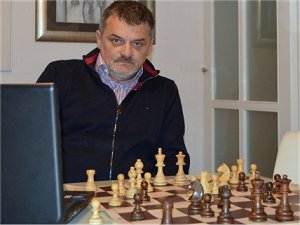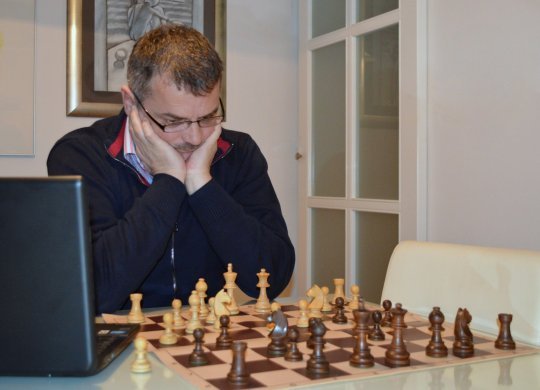


Nowadays, a match for the world championship in chess lasts about three weeks. For correspondence players this is not much - even though they do no longer exchange moves by sending postcards around the world. But the final of current world championship began 10th June 2013 and the tournament is not yet over. But the winner is already certain. The 49-year old engineer Leonardo Ljubicic from Omis, a small village near Split, is the new king of the correspondence players. For him, playing in the final of the world championship meant to spend about two to three hours per day analysing chess. At weekends twice as much.
Over-the-board chess is a kind of mental wrestling match between two human beings but todays correspondence chess is more like a kind of scientific duel, fought on a virtual chessboard. One thing is particularly important: using the possibilities of modern computer technology efficiently. For once, the human factor is not a source of error but helps to get better results.
A common prejudice about correspondence chess has it that it does not make much sense any more in our time of strong engines and easily available good hardware. Humans would basically do not much more than executing the moves of the engines without contributing much of their own.
Well, of course, correspondence chess has undergone drastic changes since the times of the Australian Cecil Purdy, winner of the first official correspondence chess championship 1958. But this kind of chess still has its supporters and friends as the extensive tournament schedule of the International Correspondence Chess Federation, the ICCF, and the many national correspondence chess organisations prove.

Leonardo Ljubicic, winner of the 28th World Championship in Correspondence Chess
Correspondence chess is more or less played without without an audience. After all, the players do not face each other directly but are sitting in the private of their study and exchange moves on a virtual board. But the final of the 28th World Championship in Correspondence Chess was played on the ICCF webserver and this allowed spectators and fans to follow the tournament on the ICCF and to get information about the players.
With eight draws and four wins the new World Champion scored 10.0/16, won more games than any other player and achieved a smooth victory. You see a lot of "correct chess" in correspondence chess and thus only about 13% percent of all games were decided. But a look at the games reveals that there were only a few short, friendly draws.
After winning games after eight and thirteen months the Czech player Boukal took an "early" lead in the tournament. But at the end of 2014 Ljubicic scored his second and third wins and took the lead. On 30th September 2015 he then managed to bag his fourth win.

The new World Champion of Correspondence Chess
indulging in his hobby
Among the participants were a number of remarkable players. For instance, Mark Noble, a Correspondence Grandmaster from New Zealand who also is an excellent blitz player who has won a number of titles in this discipline. On top of that he also plays Boule for New Zealand - a sport that is quite popular in New Zealand and other countries of the former British Empire.
Not to forget the 76-year old Italian Fabio Finocchario, who won the 25th World Championship in Correspondence Chess. For these players - and for all the participants in the tournament - chess is a hobby. A hobby that takes a lot of time but that still remains a hobby. But their continuing success proves that correspondence chess is more than copying moves from engines.
Links:
Das Final of the 28. World Championship of Correspondence Chess
| Advertising |